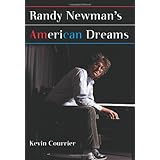
Average Reviews:

(More customer reviews)Like one of the other reviewers of this book, I was more glad of its actual existence than bothered by any of its flaws. Those flaws are as otherwise described; namely a tendency on the author's part both to focus on other, not always relevant, artists, and to assume that his own interpretation of the meaning of any given Newman song is necessarily the "correct" one. The former is frequently not a flaw at all - I was perfectly happy, for example, with the number of pages devoted to Harry Nilsson, partly because Nilsson was another exceptional artist, and partly because he was relevant to the book. But 3 pages about a Procul Harum song based on "The Beehive State" was something I skimmed past.
This is mainly a matter of personal preference, which is my main problem with Courrier's book. Consider, for example, Courrier's interpretation of "My Life Is Good". This, he says, is "a savage attack on yuppie values". Really? I'd always enjoyed the idea that it was Newman actually admitting, or even celebrating, his own indifference or selfishness, or at least suggesting that such traits are worth consideration beyond mere condemnation. The Randy Newman whose songs I enjoy is someone who explicitly does not tell you what to think. The author of "Rednecks", "Sail Away", "Political Science" etc is, to me, someone whose keynote is ambiguity, and the deliberate portrayal of supposedly unpalatable sentiments in a sympathetic light.
Similarly, the track "Masterman and Baby J", about which Newman said, "I wanted to write about rap bragging. It's amazing how much of it there is", becomes, according to Courrier, an attempt to "dramatize how the despair and disenfranchisement of black urban poetry has led to an incendiary and poetic form of musical expression". No evidence is presented for this assertion, and it's perfectly possible to believe (as I do) that Newman simply doesn't like rap bragging.
Courrier is, however, savvy enough to recognise and appreciate the complexity and importance of "Good Old Boys", namely that it represents Newman's giving the working class Deep South a decent hearing on its own terms, and that the opening track "Rednecks" was a satire that chose to avoid the easy target its title implied, and instead to lampoon the complacency of Northern liberals, and their own attitudes towards the Southern States. He's also good on details; I didn't know that the edition of the Dick Cavett show that spawned "Rednecks" had Gore Vidal as a guest. Merely learning this gives you a clue as to why the song was written. Also, he's clearly a fan, and this is ultimately why the book's values outweigh its flaws. It makes you want to listen to Randy Newman; in particular the pages about his first album (which I've often overlooked in favour of "Sail Away" and "Good Old Boys") had me listening to it again and recognising further virtues. The title track of "Sail Away" warrants several pages in its own right, which are again educational as well as interesting - you learn that Gladys Knight, of all people, recorded a cover of the song.
Ultimately, then, you might disagree (or not) with how some of the songs' "messages" are interpreted - I tend to see Newman as a kind of musical Larry David, fairly at home with the flaws he describes, rather than as a political figure whose job is to condemn and criticise - but this is at least a serious study of a significant artist, and well worth the reading.
Click Here to see more reviews about: Randy Newman: American Dreams
In addition to covering the life, music, and philosophy of Randy Newman, an enigmatic and audacious American composer, this biography looks at why he has been so largely unacknowledged-and misunderstood-by listeners and fans alike. Delving into the reasons for Newman's peripheral status on the cultural landscape, this suggests that, at heart, he has always been a musical outsider, that he has even built his mainstream career on a brilliant disguise. Using the conventions of American pop as a devious strategy, Newman incorporates into his barbed and satirical work the role of the untrustworthy narrator. In his songs, he wickedly enacts character dramas in order to play a variety of dubious roles: a slave trader in "Sail Away," a stalker in "Suzanne," a born-again yuppie in "It's Money That I Love," and an American demagogue in "Political Science." This is an illuminating portrait of an American artist as a masked man, an artful dodger who remains an American music enigma.
Click here for more information about Randy Newman: American Dreams

0 comments:
Post a Comment